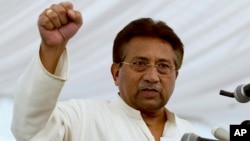ISLAMABAD —
A day before his trial for treason, Pakistan’s former military president Pervez Musharraf said the charge is unfounded and the result of a political vendetta.
In a special video message to a gathering of more than 200 retired army generals in Islamabad Tuesday, Musharraf vowed to “boldly” confront the treason trial and other legal challenges facing him to prove them wrong.
“All these cases are framed cases. I have not done anything for myself, for my family’s benefit. I only acted for the country and for its people. [And that] these are all concocted cases and [through the legal fight I will] expose them that way," said Musharraf.
The treason trial against Musharraf originally was to open last week but a bomb scare prevented him from attending the proceedings. The three-member special court postponed the hearing and the former military strongman is scheduled to appear before the judges on Wednesday.
Pakistani authorities say they have put in place tight security measures to ensure resumption of the legal proceedings. Musharraf faces the death penalty if found guilty. His legal team has challenged the impartiality of the judges and Musharraf in his Tuesday address suggested he had been treated unfairly.
“But I personally hope and I expect that now justice will be done in the future," said Musharraf.
The trial of a former army general is unprecedented in a country where officers of the military have enjoyed an undeclared immunity from being put on trial in civilian courts.
Musharraf has claimed that the military is upset by his treatment and that he still enjoys backing of Pakistan’s most powerful institution.
Musharraf seized power in a 1999 military coup by deposing Prime Minister Nawaz Sharif, who has now returned to office. The treason charge against Musharraf relates to his last days in office in 2007, when he imposed an emergency rule in Pakistan and dismissed dozens of judges.
The former president stepped down in 2008 and months later he left the country in self-imposed exile.
Musharraf returned in March intending to participate in the parliamentary polls but was barred from participating. Since then, he has faced a string of criminal cases, including murder. He was put under house arrest for months but won bail in all the cases.
The 70-year-old former military leader lives in his farmhouse just outside Islamabad under tight security.
In a special video message to a gathering of more than 200 retired army generals in Islamabad Tuesday, Musharraf vowed to “boldly” confront the treason trial and other legal challenges facing him to prove them wrong.
“All these cases are framed cases. I have not done anything for myself, for my family’s benefit. I only acted for the country and for its people. [And that] these are all concocted cases and [through the legal fight I will] expose them that way," said Musharraf.
The treason trial against Musharraf originally was to open last week but a bomb scare prevented him from attending the proceedings. The three-member special court postponed the hearing and the former military strongman is scheduled to appear before the judges on Wednesday.
Pakistani authorities say they have put in place tight security measures to ensure resumption of the legal proceedings. Musharraf faces the death penalty if found guilty. His legal team has challenged the impartiality of the judges and Musharraf in his Tuesday address suggested he had been treated unfairly.
“But I personally hope and I expect that now justice will be done in the future," said Musharraf.
The trial of a former army general is unprecedented in a country where officers of the military have enjoyed an undeclared immunity from being put on trial in civilian courts.
Musharraf has claimed that the military is upset by his treatment and that he still enjoys backing of Pakistan’s most powerful institution.
Musharraf seized power in a 1999 military coup by deposing Prime Minister Nawaz Sharif, who has now returned to office. The treason charge against Musharraf relates to his last days in office in 2007, when he imposed an emergency rule in Pakistan and dismissed dozens of judges.
The former president stepped down in 2008 and months later he left the country in self-imposed exile.
Musharraf returned in March intending to participate in the parliamentary polls but was barred from participating. Since then, he has faced a string of criminal cases, including murder. He was put under house arrest for months but won bail in all the cases.
The 70-year-old former military leader lives in his farmhouse just outside Islamabad under tight security.




